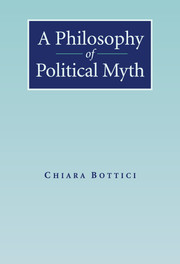III - POLITICAL MYTH
Published online by Cambridge University Press: 24 July 2009
Summary
So far, we have seen that to approach myth from the point of view of its claim to truth, as is the case with most contemporary theories of political myth, means to bring myth to a terrain that is not its own. In particular, the genealogy sketched in Part I has shown that this entails an approach to myth from the point of view of an absolute truth, to which only a unique God or an enlightened reason can aspire. In order to avoid the traps of the dialectic of the sacred logos and of the Enlightenment, which condemn myth as untrue and unreal, Part II proposed the adoption of an interrelational and phenomenological approach to myth. Myth, as we have seen, is best understood as a process involving a multiplicity of subjects, a process of continual work that responds to a perpetually changing need for significance. Human beings need names to orient themselves in the world, but they also need significance in order to live in a world less indifferent to them.
At first sight, one may think that such a human need would tend to wither away under conditions of modernity. The process of modernisation has deeply transformed European societies, as well as the relationship that human beings have with one another, and with society as a whole.
- Type
- Chapter
- Information
- A Philosophy of Political Myth , pp. 131 - 133Publisher: Cambridge University PressPrint publication year: 2007

